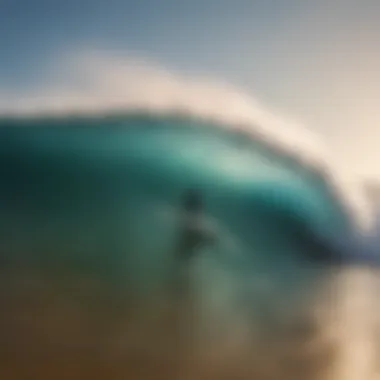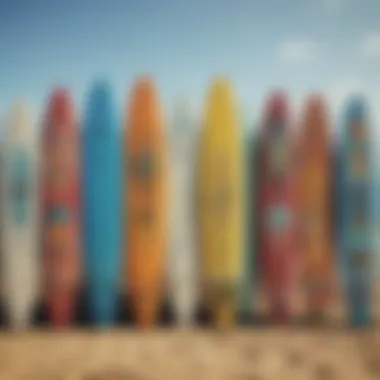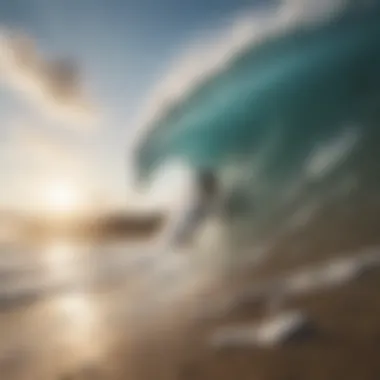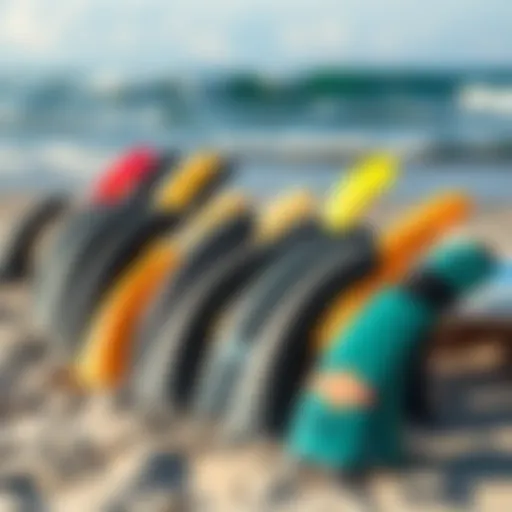Exploring Beach Sayings: History and Surf Culture


Intro
When you step onto the soft, warm sand of a beach, you enter a world rich in history and expression. Among surf enthusiasts, certain sayings resonate deeply, echoing not just through the waves but within the very culture that surrounds them. These beach sayings are more than mere phrases; they are reflections of experiences, beliefs, and a distinct lifestyle. From the cheerful shouts of a surfer catching their first wave to the wise words shared around bonfires, these expressions hold life lessons and camaraderie.
Surf culture thrives on language that evokes emotion, captures moments, and fosters connections. In this exploration, we will dive into the origins and meanings of various beach sayings, shedding light on their significance in the surfing community. By unraveling these expressions, we aim to show how they shape the identity of surfers and the life lessons learned on the water.
Surfing isn't just a sport; it's a way of life, like a vast ocean itself. Each saying, like a wave, carries with it a history, a lesson, and an invitation to ride the tide of adventure.
Let’s embark on this journey together, peeling back the layers of each saying and its impact on both surfing and beach culture as a whole.
Intro to Beach Sayings
Beach sayings are more than just words thrown around on sunny shores. They are a reflection of a vibrant lifestyle, carrying the weight of culture, tradition, and a profound connection to the ocean. Understanding these expressions is vital to appreciate how they shape the social fabric of surf culture and influence the way people interact with the coastal environment.
There’s a rhythm to how beach sayings evolve, arising from the waves of influence—cultural tides that ebb and flow, shaping the identity of both surfers and casual beachgoers. These sayings often encapsulate the experiences and emotions associated with the sea: joy, freedom, and a touch of rebellion against the mundane. By exploring these sayings, one can dig deeper into the surf community's values and beliefs, and how they embed themselves in everyday language.
Defining Beach Sayings
Beach sayings, in essence, are colloquial expressions unique to coastal cultures, often spoken among surfers and beach enthusiasts. These sayings may capture an attitude, an insight, or a shared understanding about life by the ocean. Common examples range from the straightforward “wipeout,” denoting a fall while surfing, to “the tide waits for no one,” which emphasizes the unstoppable progression of time—much like the endless waves.
This lexicon flourishes with regional flavor, with surfers from different locales adopting phrases that resonate deeply within their communities. For instance, in Hawaii, the word "Aloha" is not just a greeting but a way of life, embodying love and respect among people and nature alike. Likewise, the phrase "empty waves" refers to pristine surf spots, inviting those in the know to cherish the solitude of the ocean.
The Role of Language in Surf Culture
Language is a vessel for expressing the nuances of surf culture. It serves as the glue binding communities, giving surfers a collective voice and identity. Among surfers, the shared jargon accounts for more than mere communication—it reflects experiences that shape their lives.
Consider how phrases like "catching a wave" convey a dance with the elements rather than just riding a board. In this manner, language becomes a soundtrack to the oceanic adventure, echoing laughter, camaraderie, and challenge. Moreover, as surfers bond over these sayings, they create a communal identity, fostering a sense of belonging.
In the digital age, this role has only intensified. Social media platforms like Facebook and Reddit offer surfers spaces to share their lingo, spread cultural expressions, and connect with each other across geographical boundaries. The proliferation of memes also injects humor and relatability into surf culture, ensuring that new sayings arise with every swell and trend.
"The ocean is a canvas; beach sayings are the strokes of cultural expression that bring it to life."
With the right blend of tradition and innovation, beach sayings will continue to shape surf culture, making it an ever-evolving and captivating narrative.
Historical Context of Coastal Expressions
Understanding the historical context of coastal expressions is vital for anyone intrigued by the world of beach sayings. These idioms and phrases are not merely superficial whims of language; they bear the weight of cultural traditions and reflect the evolution of the surf culture as we know it today. By examining where these expressions come from, we gain insight into the values, challenges, and communal experiences of those who ride the waves. This examination reveals how deep-rooted terms can influence behaviors and interactions among surfers and beachgoers.
Origins of Beach Sayings
Beach sayings often have surprisingly rich etymologies, intimately tied to the regions where they originated. They encapsulate the ambient essence of a locale while also providing a window into the collective psyche of its people.
For instance, take the phrase "the ocean is calling." This is not just a poetic way to speak about an affinity for the water. Its origins can be traced to the deep bond many coastal communities forged with the sea, particularly among indigenous populations who depended on the waves for sustenance and survival. It conveys not only an invitation to surf but also a yearning—a call to connect with something larger than oneself.
Similarly, sayings like "ride the tide" capture the notion of adapting and flowing with the ever-changing dynamics of surfing and life. It translates a fundamental lesson that all wave riders understand: timing and rhythm are essential, a belief that resonates beyond the water and into personal endeavors.
The kairos of beach sayings, in essence, solidifies a connection to history, nature, and culture, making them indispensable in surf vernacular.
Cultural Influences on Coastal Language
Coastal language doesn’t evolve in a vacuum. It is remarkably shaped by a medley of cultural influences, including local traditions, global interactions, and environmental factors. The prevalent lingo among surfers often incorporates language and expressions from various cultures, reflecting the universal nature of the sport.
For instance, the use of Hawaiian terms, like "Aloha" and "Haole," in the surfing community offers a rich backdrop against which beach sayings have developed. These words originate from indigenous Hawaiian language and convey more than mere greetings; they reflect values such as respect, friendship, and belonging. As surfing has spread globally, these expressions traveled with it, adapting to the nuances of different cultures.
Moreover, the rise of surf culture in the United States during the 1960s introduced concepts from the counterculture of the era, shaping the vocabulary used today. Terms like "gnarly" and "stoked" emerged from a fusion of surf language with broader youth subculture sentiments, encapsulating feelings of excitement and exhilaration. This blending highlights the interconnectivity between surfing and societal movements—resonating not just within coastal communities but also weaving itself into the fabric of popular culture worldwide.
Ultimately, the cultural influences on coastal expressions reveal a tapestry where language serves as a conduit for shared experiences, collective identity, and evolving societal norms.


Popular Beach Sayings and Their Meanings
Understanding popular beach sayings sheds light on the values and traditions that define surf culture. These expressions aren't merely playful phrases; they encapsulate experiences, ideologies, and the lifestyle that beachgoers and surfers hold dear. By probing into their significance, we can further appreciate how language harmonizes with the rhythmic pulse of life near the ocean. Not only do these sayings serve as a means of communication, but they also forge connections among those who share the love for the surf.
Common Phrases and Interpretations
Beach sayings range from the comforting to the challenging, capturing myriad emotions that reflect the relationship between surfers and their environment. Here are several common phrases:
- "Hang ten": This phrase speaks of placing all ten toes over the front of the board, a skillful act that showcases a surfer’s ability. More than just a physical maneuver, it symbolizes enjoying the ride to its fullest.
- "Surf's up": A call to action, this saying ignites excitement. When enthusiasts hear it, they know the waves are prime for riding. The expression brings a sense of urgency and togetherness among surfers.
- "Catch a wave": This phrase embodies the very essence of surfing. To catch a wave is not just to ride it; it represents seizing opportunities. This resonates deeply with surfers who regard each wave as a fleeting moment meant to be embraced.
Each of these sayings has evolved over time, echoing the joys and challenges faced in surf culture. The playful, yet profound nature of these expressions illustrates how language serves as both a bonding tool and a cultural identifier.
Regional Variations and Their Significance
Beach sayings often vary regionally, reflecting the local culture and community. These differences highlight how unique histories shape the language of surfing. For instance:
- "Wipeout": While this term is universally recognized among surfers, it paints a vivid picture in California, where wipeouts are seen more comically than perilously.
- "Swell": In Hawaii, this term outlines not just the physical quality of waves but also the sentiment shared in the surf community, signifying a well-formed wave worth riding.
- "Chill": Used commonly in beach towns, this term evokes relaxation and ease, illustrating how local culture thrives on a laid-back vibe.
This variety in beach sayings doesn’t just add color to the language; it encapsulates the spirit of surfing in different locales. Knowing the regional expressions fosters a deeper understanding of each surfing community's values and experiences.
By examining these phrases and their regional flavors, surf enthusiasts gain insight into the diverse tapestry of surf culture—and how language can act as a vessel for tradition and connection.
Impact of Beach Sayings on Surf Culture
Beach sayings do more than just pepper conversations among surfers; they encapsulate the very essence of a lifestyle molded by ocean waves, sun-soaked sands, and camaraderie. Understanding their significance extends beyond mere semantics. Beach sayings reflect the values and beliefs of surf culture, shaping the way practitioners view not just the sport, but their environmental surroundings and community interactions.
Influence on Surfing Practices
In the surf world, the lingo is more than just jargon; it shapes behaviors and practices. Common expressions like "Catch the wave" or "Hang loose" serve as mantras that motivate surfers to approach their sport with a specific mindset. Just like shorthand in academic circles, these sayings facilitate a deeper connection amongst surfers.
For instance:
- "Go with the flow" - encourages flexibility, adapting quickly to changing conditions on the water.
- "Dude, surf’s up!" - is an urgent call to action, igniting a sense of excitement and urgency in the community.
These phrases embody a unique philosophy that informs behaviors and practices, as they resonate deeply within the surfing community. Surfers inherently adopt these beliefs, which then translate into their respect for the ocean and fellow surfers.
Moreover, there's a debate around 'surf ethics' that emerges from these expressions. Sayings emphasize respect for local surf spots and camaraderie among surfers. When someone uses the phrase,
"Respect the locals,"
it highlights an unspoken code that is essential to fostering harmony in shared spaces. This respect extends to the practices of surfing—whether that involves waiting for your turn on a crowded wave or carrying out your trash from the beach. Beach sayings plant seeds of responsibility, thus influencing how surfers conduct themselves and interact with their environment.
Shaping Community Identity
Surf culture relies heavily on a strong sense of community, and beach sayings are paramount in cultivating this identity. Phrases like "Surf's up!" or "Life's a wave—ride it!" serve to unify surfers under a shared experience. These expressions not only define a lifestyle but also create an in-group, fostering connections among those who share similar passions.
The language also acts as a cultural marker, influencing how surfers perceive themselves in relation to the world. For many surfers, the act of speaking their own lingo forms a bond and a source of pride. This community identity is significant as it channels belonging among surfers, differentiating them from, say, beachgoers who might be merely tourists.
Here are a few ways beach sayings contribute to community identity:
- Shared vocabulary strengthens bonds and a sense of belonging.
- Cultural storytelling rooted in these sayings can pass down lessons and experiences through generations.
- The reinforcement of values and ethics shared through language nurtures understanding and respect for the ocean.
Emotional Resonance of Beach Sayings
Beach sayings hold a particular kind of magic that resonates deeply with those who frequent the coast. These expressions often encapsulate feelings of freedom, adventure, and a sense of belonging. They echo the carefree spirit of the ocean and connect individuals not just to the waves, but to each other. This emotional resonance is pivotal; it serves as a thread that weaves the surfing community closer together, creating bonds through shared language and experiences.
Expressions of Freedom and Adventure
When surfers unfurl a phrase like "Catch a wave, ride a life," they are not just remarking on a sport; they are encapsulating a philosophy. This phrase, and many like it, embody the feeling of liberation that comes with the surf lifestyle. Much like the waves themselves, these sayings can rise and fall in importance among beachgoers but never truly disappear.


Surfing is an escape from the mundane, a way to brush aside the stress of everyday life as one embraces the exhilaration of riding the waves. Sayings often reflect this mindset. For example, one might hear, "Go with the flow!" which nonchalantly encourages surfers to adapt to the unpredictable nature of both the surf and life itself. This confessional language acknowledges that life, much like the ocean, may not always play nice. It urges surfers to take risks, offering a metaphorical nudge to toss caution to the wind.
"For surfers, catching a wave is akin to poignant moments in life, filled with adrenaline, beauty, and sometimes, a bit of chaos."
Surf culture thrives on an underlying narrative of adventure. This emotional concoction can often be articulated through various beach sayings that inspire people to push beyond their limits. Each time a surfer hits the water, they do more than just seek thrills; they embrace potential, their hearts pounding in harmony with the ocean's rhythm.
Connection to Nature
The bond between beach sayings and nature is another layer worth exploring. For surfers, the ocean is not merely a playground but a sacred environment that shapes their identities. Sayings like "Saltwater cures all wounds" reveal much about this relationship. They suggest that the salty breeze and crashing waves aren't just a backdrop; they play an instrumental role in fostering emotional well-being and a sense of peace.
With each wave, there is a lesson about unpredictability and respect for nature. Surfing allows individuals to develop a deep connection to the sea, reminding them of their smallness in an expansive universe. As one navigates through waves, they embody a philosophy that champions harmony with nature. This calls to mind sayings such as "Ride the tide, don’t fight the waves," which urges surfers to align with the unpredictable currents rather than struggle against them.
Through evocative language, these sayings cultivate a deeper connection to nature. They serve as reminders that humans are part of something larger than themselves. The emotional impact of these expressions can’t be overlooked, as they shape how surfers interact with the world around them. Not only do they inspire adventure, but they also promote respect, coexistence, and a profound appreciation for the earth’s boundless beauty.
Notable Beach Sayings in Surf Literature
The world of surf literature is a tapestry richly woven with sayings and quotes that capture the essence of surfing, the ocean's spirit, and the free-spirited lifestyle it promotes. These expressions not only reflect individual experiences but also weave a collective narrative that fans of surf culture hold dear. By examining notable sayings from revered surf writers, we gain insight into the philosophy underpinning the surf lifestyle—the exploration of freedom, adventure, and a deep connection with nature. This section preserves the legacy of these sayings, showcasing their influence on the broader cultural landscape and the personal ethos of surfers.
Iconic Quotes from Surf Writers
Surf literature is replete with memorable quotes that resonate with enthusiasts, echoing sentiments that often extend beyond the water. For instance, "The ocean stirs the heart, inspires the imagination, and brings eternal joy to the soul," penned by Wyland, encapsulates the profound emotional connection surfers often feel toward the ocean. Such quotes serve not just as inspirational mantras but also as a reflection of what surfing means on a fundamental level—an invitation to connect with nature and oneself.
Another figure, Jack Kerouac, in his cult classic On the Road, touches on the spontaneity of surf culture when he states, **"The road must eventually lead to the whole world." ** His words exemplify the insatiable wanderlust that often accompanies a surf-centric life and the idea that every wave can lead to a new adventure.
These expressions carry weight, solidifying their place in surf literature. They offer both emotional resonance and communal identity, reminding surfers of their roots and the shared love for the ocean.
Literature’s Reflection of Surf Culture
As a mirror to society, literature informs and reflects the ethos of its time. Surf literature is no exception as it captures the evolution of both surfing and its wider cultural implications. Historically, surf writings have reflected changes in societal values and attitudes toward nature and adventure. This connection unfolds through iconic writings like The Dangerous Coast by Zane Grey, who captured the raw beauty of surf-ridden shores and instilled in the readers an appreciation for the unadulterated appeal of coastal locations.
Moreover, the portrayal of beach sayings in these texts serves as not only a linguistic tool but also as a cultural commentary. The phrases that pervade surf literature often reflect a community's deeper aspirations, from seeking thrills to advocating for environmental stewardship. For instance, the saying, "The best surfer out there is the one having the most fun," highlights the culture's inclination toward enjoyment over competition, facilitating a space where each soul riding the wave shares in the thrill.
Understanding how these sayings play out in surf literature is crucial for grasping their significance. They connect generations of surfers, instilling values that transcend mere wordplay, influencing not just paddling out but a lifelong relationship with the sea itself. In this light, literature becomes not just a narrative art but a teacher of surf ethics, capturing wisdom that has endured and flourished through the ages.
"To me, the beach is the most honest and real of places. Any saying that comes from it has a life of its own." - A nod to the sentiment of many surf writers whose words continue to inspire.
The legacy of notable beach sayings in surf literature stands continually relevant, serving a purpose that goes beyond mere expression. It offers a window into the seeker's soul, forging a bridge between the waves that riders navigate and the literary expressions that guide their journey.
Web Influences: Beach Sayings in Digital Media
The digital realm has brought about a significant transformation in how beach sayings are shared and appreciated within surf culture. In today’s fast-paced online world, the phrases that once echoed along the coast have found new life on social media platforms and websites. The impact of this evolution is profound, influencing not only the way surfers communicate but also the global perception of surfing itself.
The connection between social media and surf culture is undeniable. Instagram, Facebook, and TikTok play pivotal roles in spreading not just photos but vibrant expressions that encompass the spirit of the ocean. Hashtags such as #SurfLife or #BeachVibes enable surfers to connect globally, exchanging local sayings that might carry rich histories or humorous anecdotes. These platforms make it easy for a surfer in California to learn about the lingo of surfers in Australia, thereby broadening their understanding of each other’s unique culture. This phenomenon creates a melting pot of phrases that might otherwise be isolated to certain geographical regions.
Social Media and Surf Culture
Social media has become the lifeblood of modern surf culture. It is through these platforms that video clips, photos, and expressions of joy from riding waves make their rounds. Users often tag their posts with beach sayings that resonate with their experiences. For instance, terms like “catching some rays” or “riding the curl” have made the jump from the beach to the screens of thousands, fostering a sense of community among surfers regardless of where they are surfing.
Moreover, social media has helped to democratize the sport. More people than ever feel they can partake in surf culture, as catchy phrases become accessible and relatable. However, this wide dissemination of sayings can sometimes dilute their original meanings. It’s a bit like playing telephone, where the essence can become lost over time. In that sense, it’s crucial for surfers to understand the origins and depths of these expressions, as even a small shift can change the flavor entirely.
Memes and Contemporary Sayings
Memes have emerged as a modern cultural phenomenon, often ridiculing or celebrating aspects of surf culture. Phrases like “Hang Loose” or “No Bad Waves” are often featured in funny images that circulate widely, shaping how both surfers and non-surfers perceive the lifestyle. These memes provide a bridge between serious surf culture and everyday humor, making beach sayings more than just phrases; they evolve into almost a universal language among enthusiasts.
Yet, there’s a certain irony here. While memes can simplify and spread these sayings, they can also undermine the profound connections people have with the ocean and surfing. It’s critical for surf aficionados to maintain that nuance and depth in their communications, understanding how a simple meme might lack the gravity of the experiences behind the words.
As the saying goes, "Every surfboard has a story."


Beach Sayings and Their Educational Role
Beach sayings serve not just as playful expressions within surf culture; they also carry significant educational value. This importance lies in how these sayings encapsulate core values that resonate deeply with surfers. They become tools for spreading knowledge about the ethical behavior expected in and around the waves, creating awareness about the environment, and fostering a sense of community among surfers.
Teaching Surf Ethics through Language
Teaching surf ethics through these expressions reinforces the values of respect, safety, and camaraderie that underpin the surfing culture. Phrases like "share the wave" emphasize the importance of taking turns and avoiding crowd chaos. It’s a simple saying, yet its implications reflect a broader commitment to mutual respect among surfers and beachgoers alike.
By using familiar sayings in surf lessons, instructors can convey crucial messages regarding ocean etiquette, promote safe practices, and encourage new surfers to connect with the community ethos. These sayings often evolve over time, reflecting changes in societal norms around surfing. For instance, the phrase "leave only footprints" encourages surfers to be mindful of their impact on the beach environment.
Furthermore, to internalize these ideals, surfers frequently repeat them in conversations, ensuring they become second nature. Surf shops, schools, and local communities can utilize these sayings to further engage surfers of all levels, making the learning process feel accessible and relevant.
Promoting Environmental Awareness
In addition to surf ethics, beach sayings also play a vital role in promoting environmental awareness. Language is a powerful tool; it can inspire action. Sayings such as "protect our playground" or "keep our waves clean" compact complex ideas into memorable phrases actionable. These messages encourage surfers to think critically about their relationship with the ocean and the environment.
Integrating these sayings into educational programs can amplify their impact. Schools that focus on surfing or coastal environments can incorporate these phrases into curricula, teaching about the ocean’s ecosystems, conservation efforts, and the importance of sustainable practices. The effectiveness of these sayings lies in their ability to spark interest and initiate conversations about broader environmental issues, such as pollution and climate change.
Moreover, social media platforms have accelerated the dissemination of these messages. Posts featuring beach sayings not only raise awareness but also mobilize community action, gathering surfers for beach cleanups or advocacy campaigns.
"In the surf world, every saying has the potential to be a lesson. It's a reminder that language carries weight, and with it, we can foster a culture of respect and awareness."
Ultimately, the intersection of language and education in surf culture is profound. Beach sayings are not trivial or just for fun; they're vital educational tools that help shape ethics and environmental consciousness among surfers, creating change one wave at a time.
Future Trends in Beach Sayings
As we look ahead, the world of beach sayings continues to evolve, reflecting the changing tides of culture, technology, and social interaction. The importance of understanding these trends cannot be overstated. They shape how communities talk about their environment, their activities, and their identity. Trends in beach sayings not only highlight linguistic evolution but also touch upon social dynamics, behaviors, and shared values in surf culture.
Evolution of Language in Surf Spaces
Language in surf spaces is dynamic and, like the waves themselves, constantly reshaping. Over time, terms that once seemed exclusive to surfers have found their way into broader conversations. Words like "stoked" and "gnarly" are now recognizable to anyone, surf enthusiast or not. This evolution reflects how surfing has transcended its coastal roots and captured broader cultural fascination.
Moreover, technological advancements play a significant role in this language shift. With the rise of apps and social media platforms, surfers find new ways to communicate about their experiences. Phrases created in chat rooms might gain popularity on Instagram, transforming niche jargon into mainstream language. As online communities flourish, the speed of language adaptation increases, introducing fresh expressions at an unprecedented rate.
Impact of Globalization on Local Sayings
Globalization has a two-faced impact on local beach sayings. On one hand, it enables term sharing across distant surf spots, enriching the lexicon as surfers mix and meld sayings from various cultures. For example, a phrase coined in Bali might echo through the beaches of California, taking on new significance and layers of meaning.
On the other hand, this crossover can dilute regional uniqueness. Local expressions that encapsulate the distinct vibe and culture of a surfing locale might struggle to thrive amidst the influx of broader, globally recognized terms. Surfers in different regions may fight to maintain their unique vernacular as they grapple with the influence of universal surfing culture brought on by global connectivity.
"Language is the soul of any culture; as it evolves, so too do our identities and connections to the waves we ride."
In the end, while globalization presents both challenges and opportunities for local phrases, it emphasizes the need for surfers to cherish and promote their unique voices. As they advocate for their local sayings, they simultaneously participate in a larger conversation, ensuring that the essence of their culture remains vibrant and relevant even amid changing tides.
Understanding the future trends in beach sayings not only enriches our knowledge of surf culture but also helps preserve the diverse identities within it. As new phrases emerge and old ones fade, each expression tells the story of the surfers who use them, painting a colorful picture of life by the sea.
Epilogue: The Enduring Nature of Beach Sayings
Beach sayings are more than just light-hearted expressions that float around coastal towns; they embody deep cultural meanings and connections that span generations. As we journeyed through the various aspects of this topic, it becomes evident that these sayings reflect not only the day-to-day life of surfers and beachgoers but also the evolution of coastal communities over time. From discussions on regional variations to the impact of digital media, one can plainly see that these sayings serve a purpose much greater than mere entertainment.
Reflecting on Cultural Identity
The language we use carries with it a reflection of who we are and where we come from. Beach sayings do just that—they give voice to the collective identity of coastal dwellers. Each phrase encapsulates experiences, local traditions, and the essence of what it means to be part of the surf culture. For instance, expressions such as "the tide waits for no man" remind surfers of the impermanence of each moment spent riding the waves. This particular saying reveals a shared ethos within the community: the urgency to seize the day and embrace the adventure that the ocean offers.
Furthermore, these expressions connect people from varied backgrounds, fostering a sense of unity. Shared experiences, like riding the same waves or feeling the same ocean breeze, help shape their identities. The communal aspect, born from using and sharing these sayings, nurtures relationships and creates lasting bonds. In essence, beach sayings are a living testament to cultural identity, allowing surfers to weave their personal narratives into the larger tapestry of coastal life.
A Lasting Legacy in Surf Culture
Beach sayings have left an indelible mark on surf culture, shaping not just practices but attitudes and philosophies as well. Surfers often find inspiration in phrases that resonate with the ocean's vastness and unpredictability. "Catch the wave or be left behind" serves as both a challenge and encouragement to embrace the thrills of surfing fully. Over time, these expressions have morphed into guiding principles for many surfers, emphasizing not only the action of riding waves but also the mindset needed to approach life itself.
Moreover, beach sayings often transcend their original contexts, becoming powerful symbols within the broader surfing community. They contribute to the storytelling that defines surf culture—the lore that every surfer carries as they navigate their journeys. The legacy of these sayings spans a multitude of platforms, from local surf competitions to international trips, enriching the culture and enhancing camaraderie among surfers alike.
By recognizing and cherishing these expressions, we can appreciate their role in shaping not just the language of surf culture but also its heart and soul.
"Language is the road map of a culture. It tells you where its people come from and where they are going." – Rita Mae Brown















